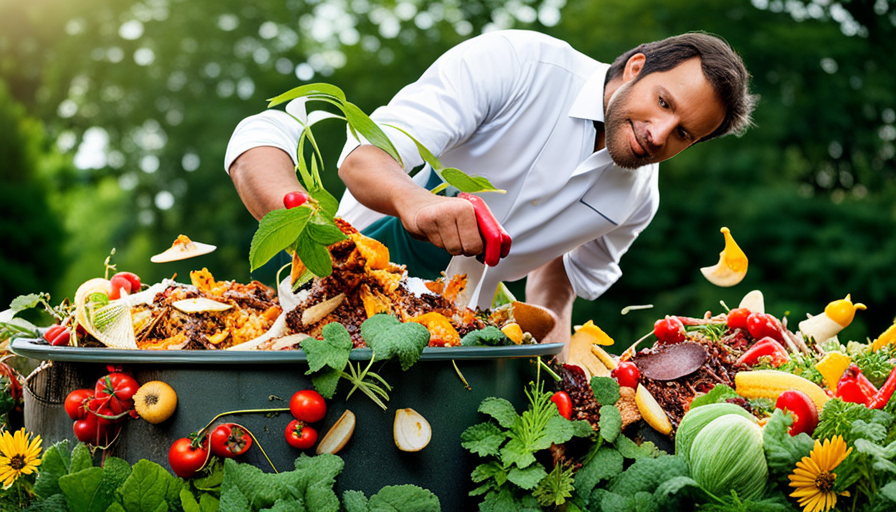Are you looking to reduce your carbon footprint and make a positive impact on the environment? Composting is an easy and effective way to do just that. By composting, you can turn your food waste and yard debris into nutrient-rich soil for your garden or plants. Plus, it helps keep organic materials out of landfills where they contribute to greenhouse gas emissions.
But maybe you’re not sure where to start with composting. What kind of container do you need? What can and can’t be composted? How do you maintain the right conditions for decomposition?
Don’t worry – we’ve got you covered. In this article, we’ll guide you through the process of composting so that you can feel confident in doing your part for the planet.
Key Takeaways
- Choose the right composting container that suits your needs.
- Balance the amount of green and brown materials for efficient decomposition.
- Proper ventilation and drainage are essential for healthy decomposition.
- Composting results in nutrient-rich soil for gardens or plants that improves structure and water retention abilities.
Understanding the Benefits of Composting
Composting’s so cool, it’s like magic – turning food scraps and yard waste into nutrient-rich soil that helps your garden thrive! And not only does it benefit your plants, but it also benefits the environment.
Composting methods vary depending on what type of composting you want to do. Some people prefer traditional outdoor composting with a bin or pile, while others opt for indoor vermicomposting with worms.
Regardless of the method you choose, the end result is always the same: soil enrichment. Compost adds vital nutrients to the soil, improving its structure and water retention abilities.
Plus, by diverting organic waste from landfills and reducing greenhouse gas emissions, composting helps preserve our planet for future generations.
So start your own compost today and reap all the amazing benefits!
Choosing the Right Composting Container
To get started with composting, you’ll need to select a container that suits your needs.
There are many types of composters available in the market, such as tumblers, bins, and worm farms. Tumblers work well for those who have limited space but want to keep their compost contained and easy to manage. Bins are great for larger yards or gardens where there is ample space for them to sit and decompose.
If you’re short on space, there are also options for composting in small spaces. For example, worm farms can fit easily under a sink or in a closet and require minimal maintenance. Additionally, bokashi bins use fermentation to break down food scraps and can be kept indoors without producing any unpleasant smells.
Whatever type of composter you choose, make sure it has proper ventilation and drainage to ensure healthy decomposition of your organic matter.
Composting Dos and Don’ts
When creating compost, it’s important to follow certain guidelines for optimal results. To avoid common mistakes, make sure you balance the amount of green and brown materials that go into your compost pile. Greens are rich in nitrogen while browns are high in carbon. Adding too much of either can throw off the balance and slow down decomposition.
Composting with limited space can be a challenge, but there are ways to troubleshoot any issues that may arise. If you notice an unpleasant odor coming from your compost bin, it could mean that there’s too much moisture or not enough air circulation. Mix in some dry brown materials like leaves or shredded paper, and turn the contents of your bin regularly to allow for proper airflow.
With a little patience and attention to detail, anyone can successfully create nutrient-rich compost at home.
Maintaining the Ideal Conditions for Decomposition
Achieving the perfect balance of green and brown materials is essential for creating nutrient-rich soil through decomposition. To maintain these ideal conditions, you must regularly aerate your compost pile to introduce oxygen into the mix. This helps microorganisms thrive and break down the organic matter more efficiently.
It’s also important to add organic matter regularly to your compost pile. Green materials like grass clippings, fruit and vegetable scraps, and coffee grounds provide nitrogen while brown materials like dry leaves, hay, and sawdust provide carbon. Adding a variety of both types of materials will create an environment that supports healthy decomposition.
By maintaining this balance and ensuring proper aeration, you can create high-quality compost that will enrich your garden soil for years to come.
Frequently Asked Questions
Can I compost meat and dairy products?
Composting meat and dairy products has pros and cons. While they add nutrients to the soil, they can also attract pests and emit foul odors. Alternatives include burying them or using a commercial composting service.
How often should I turn my compost pile?
To speed up decomposition, turn your compost pile every 2-3 weeks. This helps aerate the mixture and distribute microbes evenly. If it’s still slow, troubleshoot by checking moisture levels and adding more nitrogen-rich materials.
Can I compost pet waste?
Did you know that dog waste alone makes up 4% of landfill content? Composting pet waste can reduce this and provide nutrient-rich soil. However, it requires strict best practices to avoid harmful pathogens.
How long does it take for compost to be ready to use?
Composting benefits the environment and your garden. There are different composting methods, but the ideal time for compost to be ready is 3-12 months depending on the method used. Use it when it’s dark, crumbly, and smells earthy.
Can I compost weeds or plants that have been treated with pesticides?
Yes, you can compost weeds or plants treated with pesticides. However, it’s important to note that the chemicals may not fully break down and could contaminate your compost. To avoid this, stick to composting non organic waste instead.

